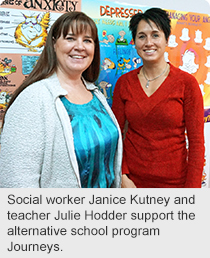
January 14, 2015
Story by Heather Marcoux
Just two years after the first students entered its classroom, an alternative school program in Red Deer has been recognized for serving youth with complex mental health and behavioural needs.
Established during the 2012/2013 school year, this specialized placement option called Journeys has already helped several students transition back to regular school programs, and in 2014 Journeys received the Premier’s Award for School Board Innovation and Excellence.
A collaborative effort between five school divisions, Central Alberta Child and Family Services, the City of Red Deer RCMP and Alberta Health Services, Journeys supports students between the ages of 11 and 18 who have exhausted all the options available through traditional schools in their own communities. The partner organizations work together to ensure students struggling with mental health issues have all their needs met.
 For Marsie Tyson of Rocky Mountain House, Journeys is just what her family needed. Tyson’s son struggled in school from the age of seven after a diagnosis of Attention Deficit Hyperactivity Disorder. Now in grade 10, her son is thriving at Journeys.
For Marsie Tyson of Rocky Mountain House, Journeys is just what her family needed. Tyson’s son struggled in school from the age of seven after a diagnosis of Attention Deficit Hyperactivity Disorder. Now in grade 10, her son is thriving at Journeys.
“His educators have been able to teach him to manage his own symptoms, teach him real life strategies and to become his own advocate. For the first time in eight years he feels he has a voice.”
Tyson’s son occupies one of ten spots available in the Journeys classroom. The smaller class size isn’t the only thing that sets Journeys apart from traditional classrooms. The presence of a social worker trained in children’s mental health provides additional support to the students.
Social worker and Children’s Mental Health Therapist Janice Kutney spent years working in children’s mental health at AHS before taking on her current AHS role at Journeys. According to Kutney, the Journeys classroom works because it’s about adapting the environment to meet the needs of the kids.
“It’s wonderful to be a part of these kids lives,” says Kutney, who helps the students develop the skills they’ll need to eventually transition back to their home schools.
“The kids never leave here at the end of the day without every incident being processed, each relationship repaired.”
Julie Hodder is the teacher in the Journeys classroom. She says Kutney is the perfect professional for this challenging role.
“It’s not just any children’s mental health therapist that would fit in this position,” says Hodder.
“I have someone to bounce ideas off, get advice from and sometimes Just having her there allows me to take a five minute breather when needed because I know that when she is left in the classroom, the students have the utmost respect for her and I know she treats them with compassion, fairness, and will maintain the stability of the classroom.”
The students respect the adults in the classroom, and Marsie Tyson says her son has noticed that the respect goes both ways.
Two months after her son began attending Journeys, Tyson asked him what he liked best about the program. The teenager told his mother the adults at his new school treat him with respect.
“At Journeys my child feels safe, respected and encouraged,” says Tyson.